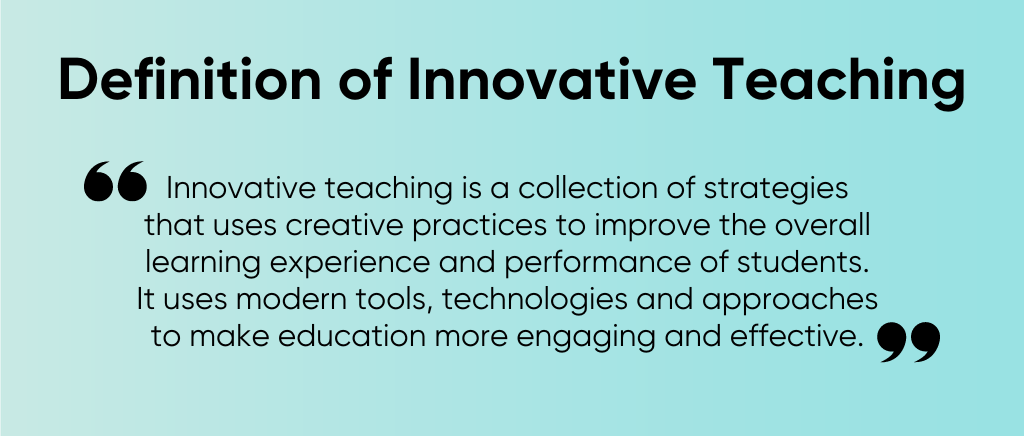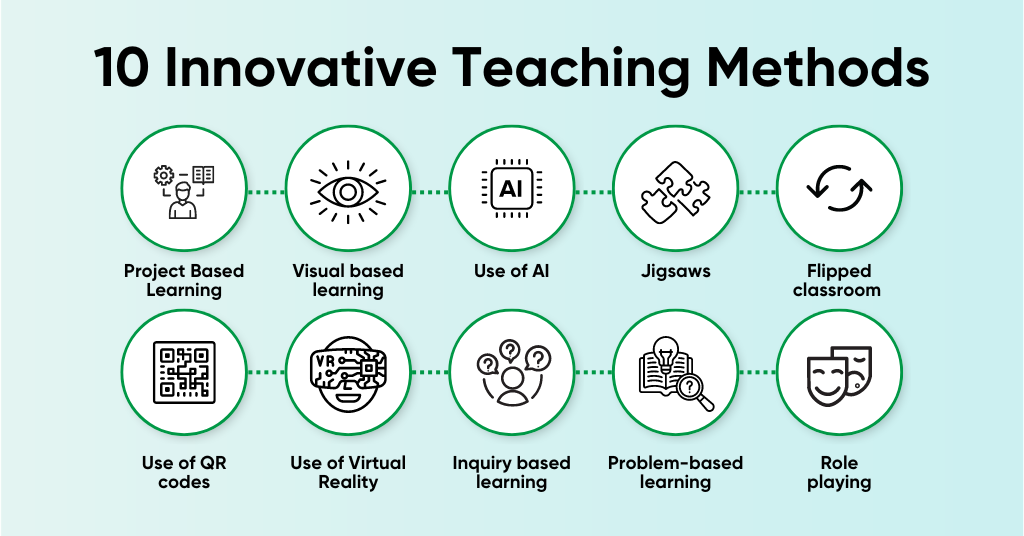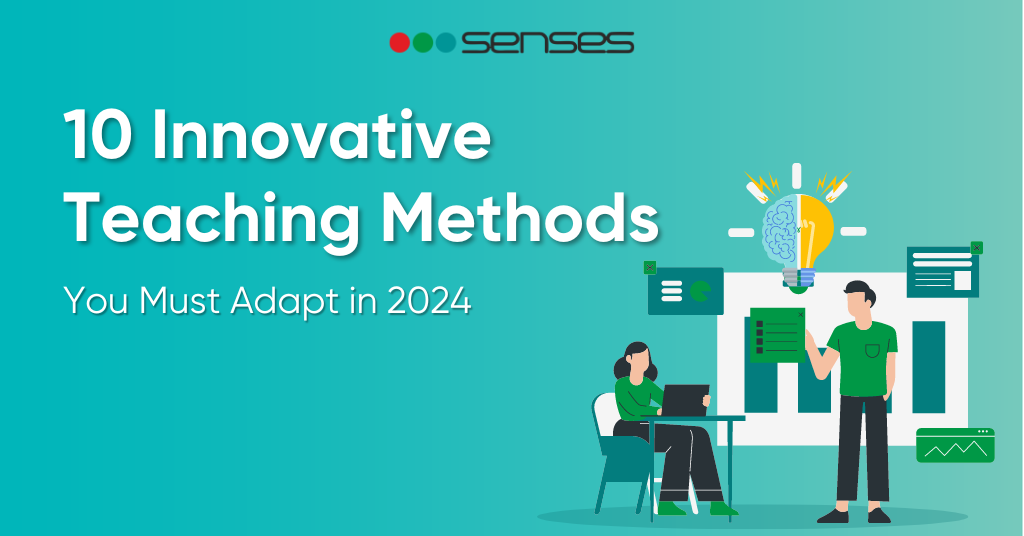Do you feel a lack of enthusiasm and engagement from students while teaching? Do you realize the need for personalized learning? Is your students’ performance not improving?
If the answer to any of these questions is YES, then you must adopt innovative teaching methods because traditional teaching strategies will not help you solve these problems.
Innovative teaching can easily solve these kinds of problems and improve the overall learning experience. Even hectic tasks like classroom management will become a lot easier for you. For students, it will make the learning process more engaging and relaxing. It will shape students’ curiosities and personalities as well.
In this article, you will get to know –
- What is innovative teaching?
- Why is it needed?
- 10 Innovative teaching methods
What is Innovative Teaching?
Before talking about innovative teaching methods, let me tell you what exactly innovative teaching means.

Innovative teaching is student-centric teaching that tries to achieve active participation from students. These methods help students to develop critical thinking and problem-solving skills. It uses intelligent technologies such as AI, digital tools, and virtual reality.
It is also true that the latest technologies improve the learning process, but innovative teaching methods do not always mean using modern technologies. It is also about developing a collaborative and interactive learning environment.
As an educator, instead of only writing notes on the board and giving general information, you should focus on making your interactions with students more engaging and fun.
Also, try to play with students’ curiosities.
Need for Innovative Teaching Methods with Examples
Have you ever wondered why we need innovative teaching methods? What’s wrong with the regular or traditional teaching practices?
Let’s figure out.
Suppose there are 60 students in your class, each with different social and academic backgrounds. They also differ in learning styles, such as visual or auditory learners. It would be very tough for you to provide quality teaching while fulfilling everyone’s demands. Innovative teaching methods can easily solve these kinds of problems.
You can use smartboards to provide visual and audio-based learning. Images, infographics, and videos will make the learning process highly engaging.
This is one of the reasons behind the need for innovative teaching methods.
On the other side business organizations are interested in something other than a degree but in the skill set candidates have. Skills like critical thinking, problem-solving, and collaboration have become almost mandatory for achieving the desired goals in the 21st century.
The problem is that traditional teaching methods do not fulfill the market’s demands. You cannot help your students to win in this world by using old teaching approaches.
You need new and effective teaching methods to ignite students’ curiosity and shape their personality.
And that is why we need innovative teaching methods.
10 Innovative Teaching Methods to Enhance Learning
We have discussed all the essential aspects of the innovative teaching methods.
Now it’s time to dive deeper and explore ten innovative teaching strategies.

#1. Project Based Learning
This is one of the most effective teaching strategies. Even UNESCO is working with India’s Ministry of Human Resources Development to promote project-based learning.
For this method, you need to allow your students to choose the topic of their personal interest for the project. You can suggest project topics if students are struggling to find one.
As an educator, your role is only limited to guiding students and providing required resources throughout the project.
In this way, students will develop research and project management skills as well as critical thinking skills. Projects will also give a proper shape and directions to students’ curiosity.
#2. Visual Based Learning
We all know visuals are highly engaging, and they spark our curiosity. The same happens with students as well. This is why visual-based learning is one of the most engaging and effective learning practices.
Visual-based learning is a teaching style that entirely relies on using images, GIFs, videos, infographics, as well as color-coated notes.
Visuals represent complex concepts and information in a very clean and transparent way, which makes it a lot easier for students to understand. Another plus point is that visual-based learning improves the focus and engagement of students in the learning process.
If you are thinking about implementing visual-based learning in your classroom, let me introduce you to the Intelligent Interactive Panel by Senses. This is a feature-packed interactive panel that comes with a high-quality 4K display.
By using the Senses interactive panel, you can generate 3D models and images even if you don’t have any technical knowledge.

By using the 3D model feature, you can effortlessly teach complex concepts like human anatomy and electrochemistry, which will automatically help students understand topics.
#3. Use of AI
Artificial intelligence is bringing a massive change in the education sector.
As an educator, you will get huge benefits from AI tools if you start using them in your teaching process.
AI will provide a very comprehensive and personalized learning experience to your students. By using AI, you can analyze the strengths and weaknesses of your students so you can prepare your lectures accordingly.
If you think that you would need to invest a considerable amount in AI technology to use it in your classroom, then let me tell you something.
The above-mentioned intelligent interactive panel by Senses has an in-build AI feature. You don’t need to pay for AI separately.
By using this AI feature, you can do a lot of things. Let me give you some examples –
- Make notes in more than nine languages.
- Solve Complex math problems
- Make notes using voice recognition
- Drag online educational material on the panel using Intelligent Search AI
#4. Jigsaws
This is one of the simple but effective teaching methods.
To implement this teaching practice, as an educator, you need to split students into small groups of 4 to 5 students. After this, each group will be given a different topic to learn.
Once students prepare their topics, shuffle the groups and ask students to explain their topic to their new group members.
In short, this method is based on the “We Teach, We Learn” formula.
It will help students to develop communication, collaboration as well as listening skills.
#5. Flipped Classroom
This is also a straightforward and effective teaching practice.
In this method, you ask students to prepare a particular topic at home, and in class, you help them to complete the assignments and homework.
In simple words, you turn the classroom into a house and a house into a school.
This method assists students in becoming self-dependent. Also, they can complete the whole syllabus in time without any rush.

#6. Using QR codes
Indian educational institutions have started providing QR codes on textbook cover pages.
If you scan those QR codes, you will get extra information about the topic in the form of images and videos.
Many teachers don’t have any knowledge about these QR codes, so they ignore them.
To increase the effectiveness of the learning process, teachers can scan QR codes using their smartphones and mirror them using Senses’s interactive panel.
#7. Using Virtual Reality VR
Virtual reality is an advanced technology that uses simulations generated by computers to create 3D interactive educational environments. These environments are entirely digital, but it feels natural.
Virtual reality will change the entire education system in the future because it is far beyond traditional teaching practices.
To use this method, you will need enough financial resources because this teaching method is expensive compared to others.

#8. Inquiry-Based Learning
Asking questions is a very powerful and practical activity for students. Questions promote curiosity and encourage students to explore concepts in greater depth.
This method develops research skills as students get curious to know more about the topics or concepts.
As a teacher, your job is to motivate students to ask questions as much as possible.
Some students feel shy or need more courage to ask questions in front of the whole classroom. As an educator, you should also think about these students and develop strategies accordingly.
#9. Problem-based learning (PBL)
As the name suggests, this method makes sure students learn educational concepts and adopt new skills by working on real-world problems.
To effectively implement this method, you should choose a relevant, open-ended, real-world problem. The problem should not be highly complex but demands critical thinking.
Some examples of PBL –
- Creating a strategy for reducing plastic waste in school.
- Developing emergency plans for natural disasters
- Developing strategies to increase the tree plantation
#10. Role Playing
This is a type of practical learning.
For this teaching strategy, you need to provide the context of the scenario and then assign roles to students. You can carry out individual role play or group role play.
You can take historical key events as a scenario. After this, the students will play their roles in the class.
After this, the discussion about the topic and the given scenarios will start. This is the best way to improve the understanding of educational topics and concepts.
This way students can adopt real-world skills like negotiation, teamwork, and debate.

Tips for Better Implementation of Innovative Teaching Methods
Here are some basic and simple things that you should take into consideration while implementing innovative teaching methods. some of them are as follows –
- Don’t rush, take small steps
- Keep seeking feedback
- Make necessary changes.
- See what suits your students
- Be flexible
- Don’t forget to take advantage of technology
- Take help from your colleagues if needed
How Senses Can Help You in Implementing Innovative Teaching Strategies –
Application of the discussed innovative teaching methods in class is tough, but the Senses Interactive Intelligent panel can make it easy for you. It has various advanced features such as cloud storage, endless canvas, shape & text recognition, math solver, and many more. It has built-in AI support as well.
To start implementing visual-based learning, you should replace the whiteboard with a Sense Edge panel. On its advanced 4K display, you can show images, videos, infographics, and even 3D models.
Some other features are as follows –
- Wireless file insertion
- Intelligent search
- WhatsApp & e-mail sharing
- Dual operating system (windows & Android)
- 50,000 hours life cycle
You can schedule a personalized demo at your place to experience the magic of the Sense interactive panel.
As another option, you can watch our YouTube videos as well.
Conclusion –
The above-mentioned innovative teaching methods are practical, but you will only get results after a certain time. It would help if you kept implementing these methods consistently, along with the necessary changes.
Also, don’t try to implement all strategies in one go. Apply them one by one and what works for you. Go slow and go small.
If you want to apply these strategies effectively, then you need highly skilled teachers. Train your teachers before implementing these teaching practices. And don’t forget to take advantage of technology, use Senses’s Intelligent Interactive Panels to enhance the learning and teaching experience.

